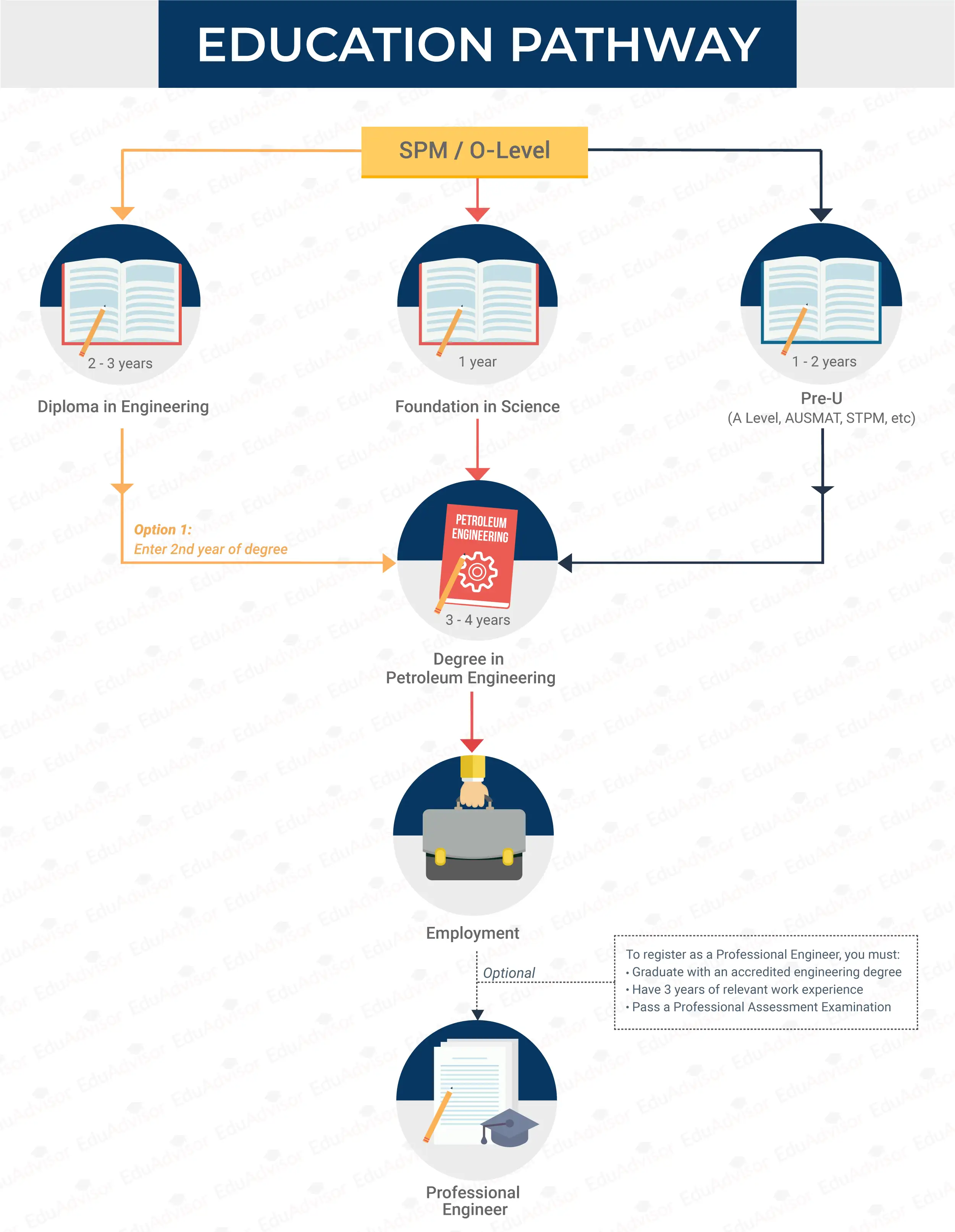The Complete Guide to Studying Petroleum Engineering in Malaysia
Interested in working in the oil and gas (O&G) industry? Learn more about studying petroleum engineering in Malaysia with this guide.

Do you enjoy solving complex mathematical problems and would like to dig deep (literally!) into the world of science and geology? Does the idea of travelling for work sound like a dream come true for you?
If you’re nodding vigorously to the questions above, then petroleum engineering may be your calling. Lucky for you, we’ve prepared a clear and comprehensive guide revealing all you need to know to about pursuing the exciting field of petroleum engineering.

Asia Pacific University of Technology & Innovation (APU)
Bachelor of Petroleum Engineering (Hons)
✓Dual-award degree – one from De Montfort University, UK, and one from APU
#1. The Basics of Petroleum Engineering
a) What Is Petroleum Engineering
 Petroleum engineering involves searching, extracting and processing crude oil and natural gas from the earth using safe, cost-efficient and environmentally-friendly methods.
Petroleum engineering involves searching, extracting and processing crude oil and natural gas from the earth using safe, cost-efficient and environmentally-friendly methods.
The role of a petroleum engineer is extremely important. They keep the world running by supplying energy to fuel homes, cars and gadgets. Besides these combustible materials, petroleum is also needed to create everyday products such as medicine, cosmetics and even plastic for food wraps and household containers.
By studying petroleum engineering, you will learn the various stages of oil production, particularly exploration (e.g. learning to predict the petroleum production potential of dig sites) and extraction (e.g. determining the most efficient drilling methods and equipment, managing the technical aspects of drilling and production).

#2. Studying Petroleum Engineering
a) Entry Requirements & Qualifications
To pursue a petroleum engineering course, you will first need to complete a pre-university course, such as A-Level, STPM, a relevant diploma or Foundation in Science. Thereafter, you can then progress to a Petroleum Engineering Degree.
(i) Degree in Petroleum Engineering
To pursue a Degree in Petroleum Engineering, you need to complete your SPM (or an equivalent qualification) and a pre-university or diploma programme.
The requirements needed to pursue a Degree in Petroleum Engineering are:
- A-Level: Minimum 2Ds including Mathematics and Physics/Chemistry
- STPM: Minimum 2Cs including Mathematics and Physics/Chemistry
- Foundation in Science or Foundation in Engineering: Minimum CGPA 2.00
- Diploma: Minimum CGPA of 2.00
A Degree in Petroleum Engineering typically takes about 4 years to complete.
Upon completing this programme, you will be equipped with a solid understanding of oil and gas exploration and production that’s required to kickstart a rewarding journey as a petroleum engineer!
b) How Does Your Education Pathway Look Like?

Step #1: Study a pre-university or Foundation in Science/Foundation in Engineering
To start, your first step is to pursue a pre-university course (e.g. A Level, STPM) or either a Foundation in Science or Foundation in Engineering. This will allow you to progress into a Degree in Petroleum Engineering.
Step #2: Pursue an accredited 4-year Degree in Petroleum Engineering
Next, you'll want to pursue a Degree in Petroleum Engineering, which will take 4 years to complete.
For degrees from Malaysian universities, you must ensure that it is accredited by the Engineering Accreditation Council (EAC) under the Board of Engineers Malaysia (BEM). For foreign degrees, the country must be a signatory of the Washington Accord.
Step #3: Register as a Graduate Engineer
After obtaining your 4-year accredited Degree in Petroleum Engineering, your next milestone is to register with BEM as a Graduate Engineer.
To progress to a professional engineer, you'll need to gain at least 3 years of relevant working experience and pass BEM's Professional Assessment Examination (PAE).
Step #4: Register as a Professional Engineer
After achieving the required professional experience and passing the Professional Assessment Examination, you're eligible to register with BEM as a professional engineer.
With this professional engineer registration, you are entitled to use the titles "Ir." (before your name) or "P.Eng." (after your name) to signify your professional status.
Summarising, the journey from SPM to becoming an engineer will take around 5 – 6 years. Advancing to a registered professional engineer status takes approximately 8 – 9 years.
Upon gaining sufficient work experience and passing the PAE, you will be eligible to register as a Professional Engineer. This gives you the privilege of using the abbreviation “Ir.” before your name or “P.Eng.” after your name to denote your professional engineer status.

Asia Pacific University of Technology & Innovation (APU)
APU Foundation Programme (Engineering)
✓Direct pathway into dual-award degrees at APU
c) What Will You Study in Petroleum Engineering?
A Degree in Petroleum Engineering will teach you everything you need to know to excel in this challenging yet intellectually stimulating industry. This includes learning how to analyse geological data, plan and construct oil wells and use special computer applications and mathematical models to enhance the petroleum production process.
Here are some subjects you might study throughout your semesters:
- Engineering Mathematics
- Fluid Mechanics
- Petroleum Geology
- Reservoir Engineering
- Drilling Engineering
- Oil and Gas Operations
- Health, Safety and Environment
- Engineering Sustainable Development
- Project Management
Some universities may require you to undergo industrial training so that you will be exposed to the professional practices of working in the oil and gas industry.
d) How Much Does It Cost To Study Petroleum Engineering in Malaysia?
A Degree in Petroleum Engineering is approximately RM59,400 – RM116,000.
#3. Why Should You Study Petroleum Engineering?
 If the idea of exploring the earth and using your love for math and geology to develop innovative ideas floats your boat, then petroleum engineering may be an excellent choice for you.
If the idea of exploring the earth and using your love for math and geology to develop innovative ideas floats your boat, then petroleum engineering may be an excellent choice for you.
Here are a few reasons why you should take up a petroleum engineering course.
(a) You are fascinated with earth sciences
Do you enjoy studying the planet’s physical characteristics and are especially curious about what lurks beneath the Earth’s surface? Then you’ll love being a petroleum engineer as you can put your keen interest in geology to good use to locate and extract precious energy resources.
(b) You want to explore the world
Unlike many jobs that require you to sit in your cubicle tapping away on a keyboard from 9 to 5, petroleum engineers often travel to various locations to explore and extract valuable oil and gas. From remote local locations in Kerteh, Bintulu and Miri to the faraway lands of the Middle East, a petroleum engineering job will see you frequently changing work environments.

(c) You are innovative and want to protect the earth
Do you have the genius mind of Jimmy Neutron or Dexter from Dexter’s Laboratory, always coming up with random yet ingenious inventions? As the demand for sustainable energy and resources rise, petroleum engineers need to develop better methods to extract resources so that harmful carbon emissions are reduced.
(d) You enjoy managing projects
Are you task-oriented and often take the lead during group assignments? This quality can help you succeed in a petroleum engineering career. Besides analysing geological data and using maths to solve technical issues, you’ll eventually need to strategically manage your own projects and ensure that everything goes according to plan.

Asia Pacific University of Technology & Innovation (APU)
Bachelor of Petroleum Engineering (Hons)
✓Dual-award degree – one from De Montfort University, UK, and one from APU
#4. What Skills Do You Need for a Petroleum Engineering Course?
 Here are some of the key skills and qualities you need to develop to do well in a petroleum engineering programme.
Here are some of the key skills and qualities you need to develop to do well in a petroleum engineering programme.
(a) Analytical skills
As a petroleum engineer, you must be able to analyse data so that you can decide on the best strategies to extract and process oil and gas. For example, geological data can reveal important information about which locations contain the most natural resources while computer-generated mathematical data can show you how much production potential there is at a particular drill site.
(b) Complex problem-solving skills
Extracting oil and gas is a tricky business. Offshore drilling is now conducted further away from the shore, making it more dangerous and at a higher risk of accidents, spills and fires. Drilling deeper underground also means intense atmospheric pressure, and the technology and equipment used are extremely complex and not entirely invincible.
Therefore, you must be able to think on your feet and quickly solve complex problems, regardless of location and circumstances.
(c) Strong science and computing knowledge
A solid background in science and computing is crucial as the oil and gas industry is exceptionally complex. You will need to be able to use your knowledge of engineering principles and apply them appropriately to build models and monitor data using complex technical software. Examples include creating plans of a reservoir’s performance using mathematical models and using remote sensing technology to resolve problems and implement engineering interventions.
(d) Teamwork skills
If you think doing an engineering course means you don’t have to liaise with people, you’re wrong! Effective communication and teamwork skills are just as important as you will have to work closely with different people who specialise in other areas of the field. For instance, you may have to work closely with a petroleum geologist to determine the location of a new oil and gas reservoir while you focus on the drilling process.
#5. What Career Options Do You Have With a Petroleum Engineering Degree?
Petroleum engineering graduates work in the oil and gas industry where they can find successful employment at oil exploration and production companies, engineering consultancies and specialist drilling contractors.
Here are some petroleum engineering-related careers that you can seek upon graduating:
- Drilling engineer
- Production engineer
- Reservoir engineer
- Well completion engineer
- Process engineer
- Quality assurance engineer
#6. Where Can You Study Petroleum Engineering in Malaysia?
If petroleum engineering is right up your alley, then check out some of the best universities for petroleum engineering in Malaysia.
Asia Pacific University of Technology & Innovation (APU)
Bukit Jalil, Kuala Lumpur
Bachelor of Petroleum Engineering (Hons)
Intake
Mar, Jul, Sep, Nov
Tuition Fees
RM116,000
Malaysia's award-winning Premier Digital Tech University







